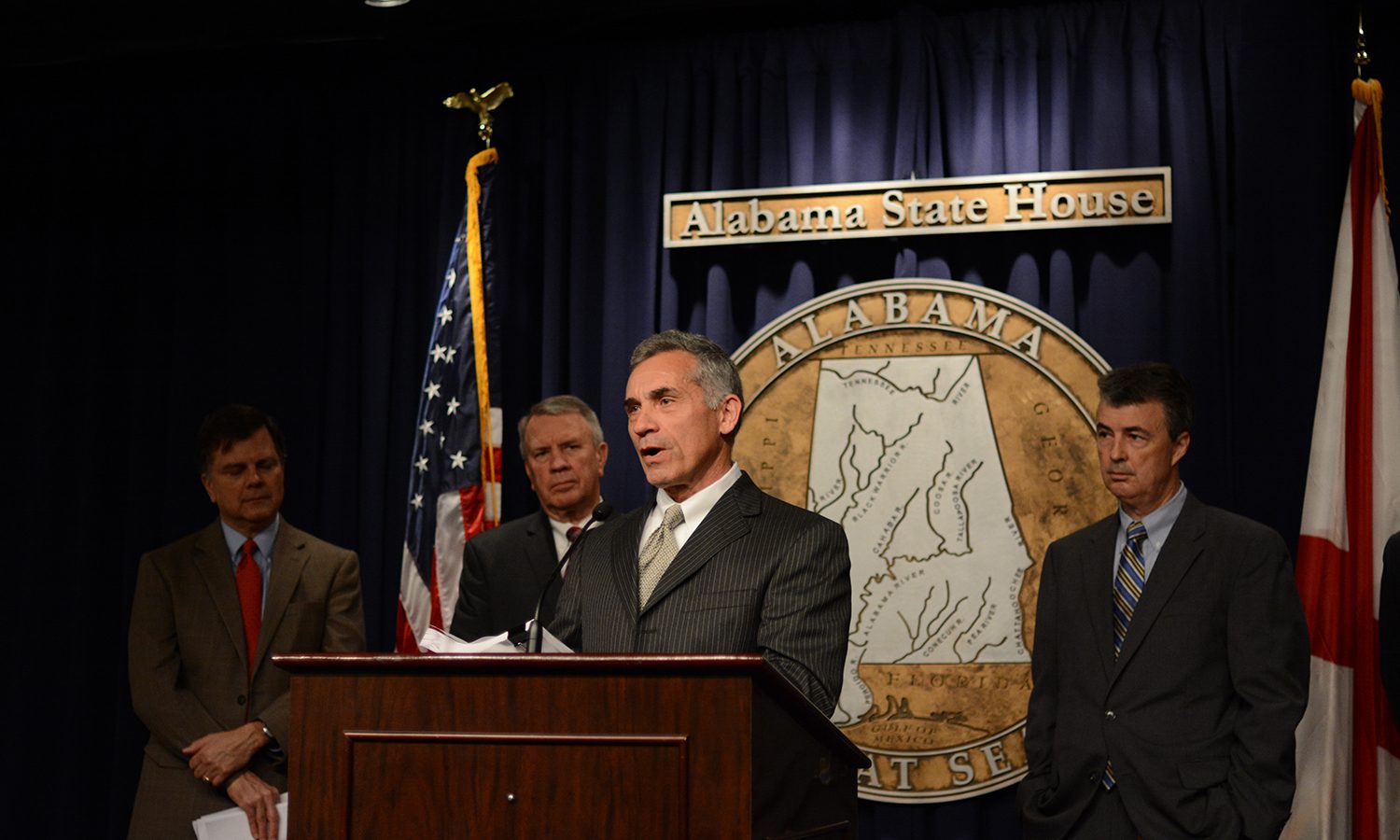Senate President Del Marsh, R-Anniston, asked the Senate Fiscal Responsibility and Economic Development Committee to hold over a bill Wednesday to exempt economic developers from the state’s lobbying requirements until after he meets with Alabama Gov. Kay Ivey on the matter today.
House Bill 317, titled The Alabama Jobs Enhancement Act, is sponsored by State Representative Ken Johnson, R-Moulton, but is being carried in the Senate by Marsh. Marsh said that he also was going to meet with the attorney general and would get back with the Committee on whether or not the Senate would take up this bill this year.
Alabama Law Institute Director Othni J. Lathram said that there was an issue on whether or not site selectors had to register as lobbyists under Alabama’s ethics law. There is a staff opinion at the Alabama Ethics Commission that they do qualify as lobbyists and do fall under that licensing regime. The Commission carried over that opinion, because the law was not clear. It was their opinion that the legislature should clarify the law.
Lathram said, “The original bill was an exception based on conduct, but there was a push back on that by law enforcement.” The bill that passed the House was rewritten with language in a bill that was being carried by Marsh that defined economic development.
Lathram said that a formal advisory opinion by the Alabama Ethics Commission would make you immune to prosecution so that no prosecutor can indict you if you were honest and accurate in your description of your activities with the commission. Lathram said that this special exception for economic developers does not apply to elected officials.
The Senate Fiscal Responsibility and Economic Development Committee is chaired State Senator Phil Williams, R-Rainbow City.
Williams said that economic developers are not usually going to be in direct contact with the public official asking for incentives.
State Senator Trip Pittman, R-Montrose, said that the Ethics Commission staff had the opinion that economic developers met the definition of lobbyists.
“I have tremendous concerns about parts of this,” Pittman said. “if you engage people for money you are lobbying.”
State Senator Clyde Chambliss, R-Prattville, said that there is a site selection process that is part of an economic developer’s job that isn’t lobbying, but there is a second phase when we go from site selection to talking to public officials.
Sen. Pittman asked, “If someone were to leave the legislature would they be able to immediately go into the field of economic development?”
Lathram replied, “You would be right, but we could tweak the revolving door act.”
Alabama Commerce Secretary Greg Canfield said, “I am charged as the Secretary of Commerce with advancing jobs and capital investment across the state of Alabama.”
Canfield said that the press “mischaracterized the process that we have been engaged in to make sure that we have a workable ethics bill.”
“I was with you when we passed this legislation initially in 2010,” Canfield, a state senator until appointed by then Gov. Robert Bentley, said. “We didn’t intend for economic development professionals to be under the ethics law.
Canfield said that in December 2015 Gregory C. Burkart wrote a column in IPT insider titled “The Accidental Lobbyist” where Burkart, an attorney in Michigan, gave the opinion that economic developers are not exempted from the Alabama Ethics Law.
Williams provided the Alabama Political Reporter with the article as part of a 16-page packet supporting passage of the Alabama Job Enhancement Act.
Burkette warns economic developers doing business in Alabama.
“Another consequence is that lobbyists are prohibited from giving anything of value to a public employee or public official.” Burkette warned that economic developers would have to provide, “A detailed statement showing any direct business association or partnership with any public official, candidate or members of the household of such public official or candidate.”
Canfield said that economic developers were not specifically written out of the 2010 ethics law and in fact, you have disagreement on the intent of the Legislature. Some of you believe that economic development would be considered to be lobbyists and there are others that believe that economic development was exempted
Canfield said that he believed that economic development can continue without falling under the definition of lobbyists if this legislation is passed.
“We are using language that the Attorney General’s office used for a very narrowly carve out,” Canfield said.
The legislature’s intent in 2010 and 2011 was not to hinder economic development. “We slowed the process down to make sure that we get it right.”
Canfield said that he has heard from Jay Garner, with the Site Selector Guild, which represents the top 44 site consultants that there are concerns that the Alabama ethics law might make premature reporting of his clients and not just once but four times a year.
Williams shared Garner’s letter with APR.
Garner wrote in a letter to Canfield, “There is growing concern among site selectors, regarding ambiguity in Alabama’s statutes that can be interpreted as requiring site selectors and other economic development professionals to register as lobbyist to legally negotiate for project incentives. That requirement would be burdensome on-site selectors.”
Garner is the president of Garner Economics L.L.C. in Atlanta.
Garner objected to, “The requirement that we attend a training event.”
”There are only two states that we are aware of that define professional economic developers as lobbyists: California and North Carolina and North Carolina is seeking to change that.
“I am here to warn you of the consequences if we don’t do something,” Canfield warned. “Georgia does not require this. Tennessee does not require this. Mississippi does not require this. Louisiana does not require this. Please consider supporting the bill.”
Pittman asked, “How much money have we allocated in incentives as a state and by local government?” “There are parts of this I support and parts of this I have serious reservations about.”
Senate Majority Leader Greg Reed, R-Jasper, said explain to me how did we go from where we are attracting companies to now being at a disadvantage.
Canfield said that until the “Accidental Lobbyist” article on December 2015 we thought we had an understanding that economic developers were not lobbyists. We have begun hearing that other states were using this against us.
“In 2017 we decided there was one way to clarify that and it was to go to the Ethics Commission and ask for an advisory opinion,” Canfield said.
Marsh said, “Two weeks ago we had a press conference where we talked about ethics reform and we created a commission to thoroughly study ethics issues in the state of Alabama. The Attorney General and others were to work on reviewing the ethics laws. I understand that the Ethics Commission has asked for clarification on this. We have this small bill and another small bill by Senator Albritton. What I am going to ask today is that that both of those bills be carried over until I can talk with the Governor. I have an appointment to see her tomorrow on this. I will talk with the Attorney General as well. I am going to ask that you not pass this bill today.”
“I want to make sure that we go down the right path,” Marsh said. “I stood in front of the public and told them we were not going to pass anything on ethics this year.”
Williams said it is the policy of the Fiscal Responsibility and Economic Development Committee that we vote on the same day that we hold a hearing. “The one exception to that rule is if the sponsor asks us to wait,” Williams said. “I will grant your request.”
The Executive Director of the Economic Development Association of Alabama (EDAA) Jim Searcy said that our members are economic developers not lobbyists and they’ve expressed concerns starting in 2016.
The President of EDAA Lee Lawson said he was a local economic developer.
“I am an employee of a 501C6 non-profit,” Lawson said. “One-hundred percent of my activities are to support growth and economic development in my community. I represent those people. I am funded by the county, 12 municipalities, businesses and individuals who contribute to Baldwin County EDA. We have a 3000 acre mega site. We were a finalist for the Toyota-Mazda site. Those site selectors did not reveal to us who they were working for until very late in the process. I am not a lobbyist, I am an economic developer.”
Pittman (who represents Baldwin County) said, “Lee you do lobby that is what you do. You ask for taxpayer money for incentives to give to private companies to come to Baldwin County. You do lobby.”
The Chairman of the Alabama Ethics Commission Jerry L. Fielding (also a former State Senator) said, “Our staff came forward with an advisory opinion, where the staff decided to write that these site consultants were covered by the ethics act. We did not want to grant that advisory opinion because the Secretary said that they were working on some things that could have been impacted.”
Chairman Fielding said that the Commission carried over the issue to their August meeting and then in August decided to carry it over to the legislature for clarification.
“Y’all are in charge of legislation and we are in charge of interpreting the legislature,” Fielding said. “HB317 is crystal clear as it has come out of the House . Four of the five Commissioners are satisified with the language in the act at hand.”
Williams asked, “If we don’t take action on this bill you are saying that you will have to deal with the vagary?”
Fielding said it is up to the legislature, “Y’all can vote it up or down.”
State Senator Jim McClendon, R-Springville, said, “I know the Ethics Commission must have some regulatory authority that the legislature has granted you. Why couldn’t you guys look at the current law and come forward with a regulation instead of asking for this?”
Fielding answered, “I don’t think there is any regulatory authorization for this. I don’t believe this part of the ethics act is covered.”
McClendon asked, “Why is there not a pro and a con?” In every hearing I have been part of in the legislature one speaker speaks in favor and the next speaker speaks against.
William said, “This is not a public hearing. This is a chairman’s hearing. The people who I invited are who is allowed to speak.”
The Attorney General’s Chief Counsel Katherine Green Robertson said, “We had a 150 page bill addressing this and that proved hard to move.”
Williams asked, “If we actually adopt this will the attorney general’s office still be able to go after bad actors?”
Robertson answered, “Yes.”
State Senator Cam Ward, R-Alabaster, asked, “You had the comprehensive bill being proposed. Are you ok with this as a standalone?
Robertson answered, “It was a compromise. We would like to have had our full bill passed. To the extent that it is addressed here the attorney general is satisfied.”
Williams shared a letter from the Attorney General with APR.
Attorney General Steve Marshall wrote, “The amendment provides a narrowly-drawn exemption for full-time lobbyists under the ethics law. This would include, for example, high-level individuals from foreign car companies or staff members of local chambers of commerce. Lawmakers and other public officials are specifically prohibited from claiming this exemption.”
“This approach to economic development has been a part of the Attorney General’s Office’s working draft for nearly two years,” Marshall wrote in a memorandum dated March 14, 2018.
Chairman Williams said that he is going to offer a, “Press Association amendment” that would ensure that everything that is available now to the press now will still be available if this passes. APR has not yet seen this amendment.
Pittman asked, “Will there be an opportunity for additional amendments?”
Williams replied, “Yes,” either next week or on the floor.
HB317 has already passed the House. Whether the bill will be allowed to move forward in this session or not will be determined by Marsh.





















































